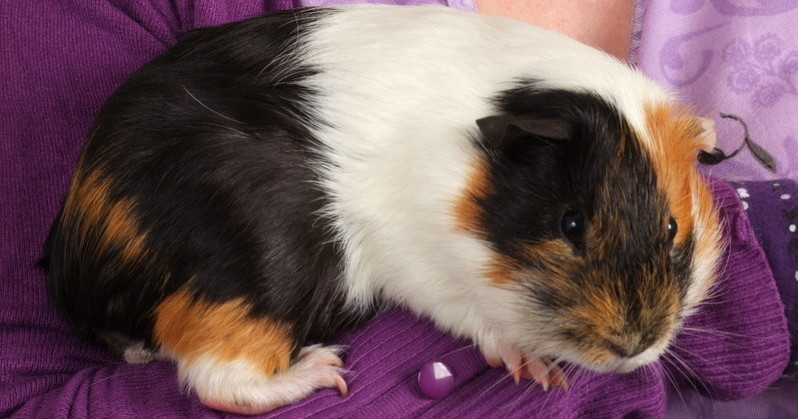
Sandra and her children are guinea pig enthusiasts. Earlier this year, the guinea pig matriarch of their household, Nutty, died at the impressive age of eight years. After a few guinea-pig-free weeks, Sandra decided that the “Nutty-sized” gap in their family life needed to be filled. She went down to the local pet shop to see what was on offer.
Guinea pigs are social creatures, living in groups in the wild. It’s kinder to keep them in pairs or small groups. When Sandra found two guinea pigs for sale in the pet shop, she decided to buy both of them, so that they could continue to enjoy each other’s company in her household.
The guinea pigs were a male/female couple (soon named Nubby and Maybelle), and they were six months old. Sandra realised that it was very likely that Maybelle would be pregnant, so she didn’t worry about separating the two of them. The pregnancy of guinea pigs is unusually lengthy, at nine weeks (three times as long as hamsters and mice) so Sandra expected that baby guinea piglets might be born in the late spring. Maybelle didn’t have an obviously swollen abdomen, so it didn’t seem as if anything was going to happen quickly.
The two guinea pigs got on well together, nuzzling each other, and cuddling up close together in the nesting area. Two weeks after they’d arrived in her home, Sandra noticed that Maybelle seemed to behaving differently to Nubby. It was as if she was being tetchy with him, pushing him away and refusing to sit beside him. Sandra didn’t think any more about this until the evening, when one of her children went to lift out a guinea pig for playtime. In addition to the two adult guinea pigs, there were two newborn babies running around the cage. Maybelle had quietly given birth during the day.
Maybelle continued to seem irritated by her “husband”, so Sandra removed Nubby from the group, putting him into a cage of his own. This was only a temporary solution to the future of her “guinea pig family”, and Sandra discussed the options with her children.
There would be no problem finding new homes for the two new guinea pig babies when they were a couple of months old, but what then? If Nubby and Maybelle continued to live together, there’d be regular new batches of babies, and there’d soon be a shortage of good homes for them.
The answer was simple: Nutty had to be neutered. He was booked into our clinic for the procedure. He arrived in the morning, and was castrated under general anaesthesia. He went home the same evening, and when he came back for a wound check five days later, it was as if nothing had happened. He was as bright and cheerful as ever, and his small scar was already almost invisible.
Nutty had to be kept away from Maybelle for a month after the operation, to be sure to avoid another pregnancy. The timing worked out well: when the two babies were taken out to go to their new homes, Nutty rejoined Maybelle in the guinea pig run. The two of them seemed pleased to see each other, huddling together and squeaking quietly to one another.
There are no worries about the “empty nest” syndrome affecting the two guinea pigs. They’re now living very happily as a long-term couple, with no chance of any more new babies disrupting their relationship.
Tips
- Guinea pigs are social creatures, best kept as pairs or in small groups
- They are prolific breeders, and there’s only a limited number of new homes for guinea pigs
- If males and females are housed together, neutering of males is the best way to prevent breeding




Comments are closed.
Please note that I am unable to answer veterinary questions in comments. If you have questions or concerns about your pet's health it is always better to contact your vet.